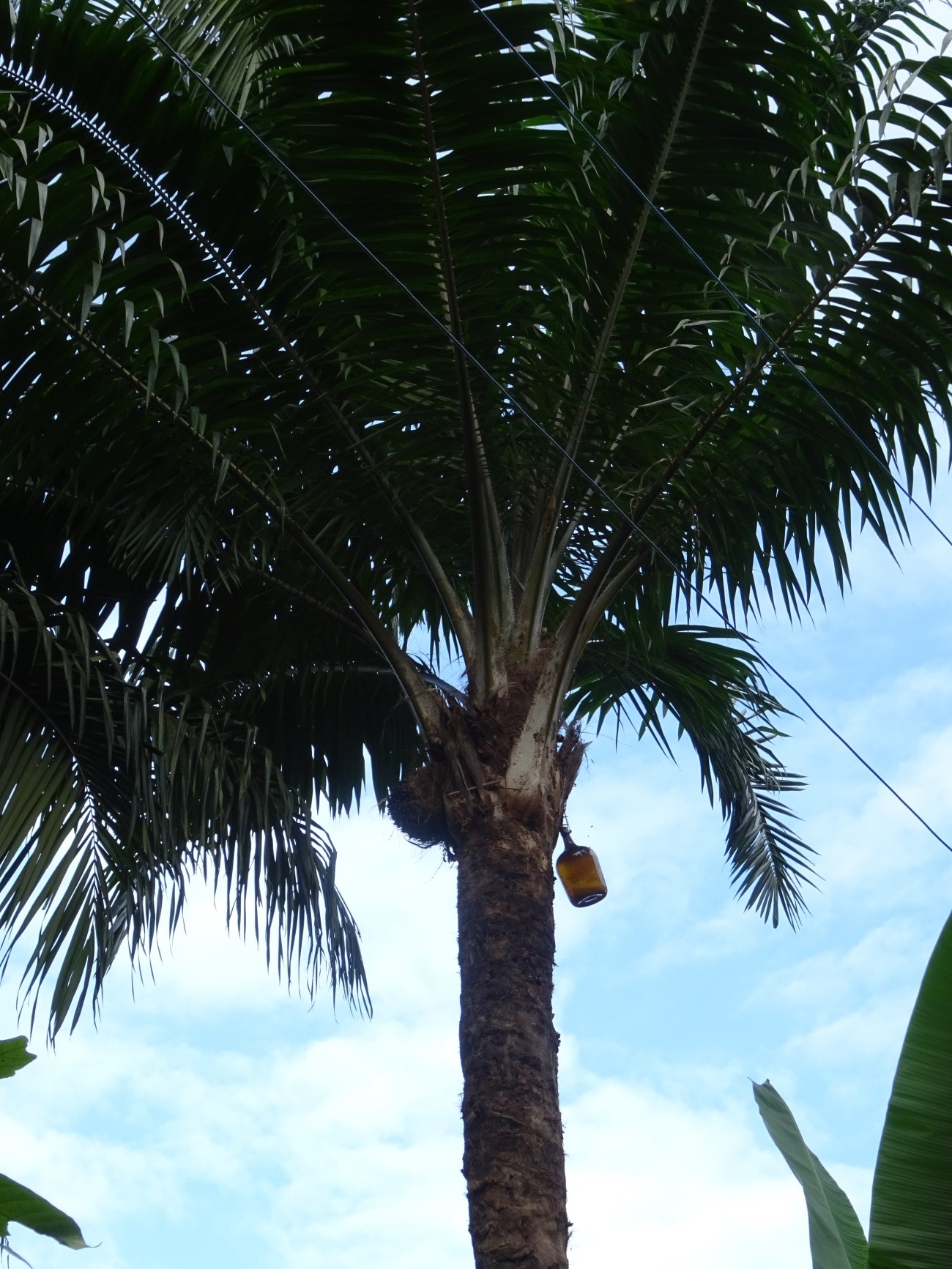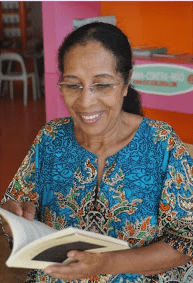A Solidão da Palmeira
Não, não era esta a paisagem a que meus olhos estavam habituados há muitos anos.
Essa palmeira fica em Molembu, roça que foi comprada por meu avô Rachid (indiano), e onde foram criados todos os seus filhos (20), incluindo minha mãe. Todos os meus tios eram vianteiros, além de terem outros afazeres.
Palmeira ancestral, familiar, ereta, bela copa estrelada de folhas verde-mar, a ela subiam meus tios e meu primo por vezes quando as estrelas ainda se estavam a despedir da noite. Primeiro subia meu tio Aurelino, o mais velho de uma prole de homens valentes, ousados, vianteiros de profissão como só eles. Tio Aurelino descia leve leve o caminho até Molembu sempre cumprimentando “Bond’jaô sobrinhaê!”, ajeitando a corda d’onsó no ombro esquerdo e na mão direita o garrafão que colocado lá no alto se iria encher do néctar precioso que a palmeira oferece. E o ritual ia seguindo a antiga tradição que serviu sempre de ganha pão extra a muitos chefes de família. Treinados desde muito jovens em subir às palmeiras assim se mantinham nesse arrojado mister mesmo com a idade a pesar-lhes nos ombros. É assim por toda a ilha.
Quando tio Aurelino descia, já Adilson, seu irmão, também ele passado dos sessenta, munido de garrafão e corda se preparava para exercitar pernas e braços até chegar ao topo da árvore abençoada que nunca negava a hospedagem das vasilhas com que a iam enfeitando. Por último, já em espera, subia Josias, filho codé de tia Semiana, que, num ápice trepava e deixava mais um garrafão na velha palmeira que nossos antepassados tinham conhecido em Molembu.
Embora sabendo que a árvore se haveria de ressentir de tanto peso a sugar-lhe o ventre era um gosto vê-la assim todos os dias na paisagem tropical de azuis e verdes com aqueles adereços quais bailarinas em dias de vento! Aquilo era uma pintura na tela da mãe-natureza. À tarde voltavam os vianteiros. Subiam, desciam e eu ouvia-os tagarelar, discutir o preço do vinho, oferecer um gole bem fresquinho a quem com eles se cruzava. Era a vida em toda a sua explosão benfazeja que a palmeira proporcionava. Eram os barulhos do mato, da floresta…
“Ninguém pode andar na rua senão polícia dá borracha” – grita a vizinha do outro lado do caminho.
“Idoso não pode sair de casa não! Vírus mata ele!” – é a voz de Ladina, enfermeira, a dar seus conselhos.
Mascarados, confinados, estamos todos mais tristes, mais sós. Até mesmo a palmeira. Tenho notado que suas folhas já não mostram o mesmo verde-mar que antes tinham. E sei que agora só Josias, para sobreviver, ainda teima em continuar a sua profissão de vianteiro.
GLOSSÁRIO:
Bond’jaô sobrinhaê: bom dia, sobrinha
Codé: o filho mais novo
Corda d’onsó: corda usada para subir às palmeiras feita com fios das folhas da palmeira (hoje já se usa pouco, preferindo os mais jovens corda de aço)
Leve, leve: resposta que marca o ritmo de vida nas ilhas
Vianteiro: homem que sobe à palmeira para lhe extrair o vinho de palma
Die Einsamkeit der Palme
Nein, dies ist nicht mehr die Landschaft, die meine Augen seit vielen Jahren gewohnt sind zu sehen.
Diese Palme steht in Molembu, einem Stück Ackerland, das mein indischer Großvater Rachid gekauft hat, wo er seine zwanzig Kinder – darunter meine Mutter – aufzog. Alle meine Onkel arbeiteten als vianteiros und widmeten sich auch anderen beruflichen Aufgaben.
Die Palme, altgedient und urvertraut, aufrecht, mit ihrer prächtigen Krone von meergrünen Blättern, auf die meine Onkel und mein Cousin so oft geklettert waren, noch bevor die Sterne sich von der Nacht verabschiedeten. Zuerst stieg mein Onkel Aurelino hinauf, der älteste einer Sippe mutiger Männer, allesamt vianteiros von Beruf, wie es keine besseren gibt. Im Rhythmus des leve leve lief Onkel Aurelino den Weg hinab bis Molembu, mir jedes Mal einen guten Morgen wünschend: „Bond’jaô sobrinhaê!“, nahm die corda d’onsó auf die linke Schulter, in der rechten Hand trug er die Korbflasche, die, oben am Baum angebracht, den wertvollen Saft auffängt, den die Palme schenkt. Und dieser Brauch folgte einer alten Tradition, die vielen Familienoberhäuptern einen Nebenverdienst einbrachte. Schon von klein an im Erklettern von Palmen geübt, behielten sie diese waghalsige Tätigkeit bis ins hohe Alter bei. Und so verhielt es sich auf der gesamten Insel.
Wenn Onkel Aurelino herunterkam, war schon Adilson, sein Bruder, der auch schon über sechzig war, ausgerüstet mit Seil und Flasche, bereit, mit der Kraft seiner Beine und Arme den Wipfel der gesegneten Palme zu erreichen, die großzügig die um den Hals gebundenen Gefäße erduldete, mit der man sie schmückte. Als letzter war Tante Semianas codé, Josias, an der Reihe, der im Nu die alte Palme erkletterte, auf die unsere Vorfahren in Molembu gestoßen waren, um ihr eine weitere Flasche umzubinden.
Auch wenn ich wusste, dass sich die Palme im Grunde gegen dieses ganze Gewicht, das ihr den Saft nahm, sträuben musste, war es mir eine Freude, sie jeden Tag so zu sehen, in der tropischen Landschaft aus Blautönen und Grün, behängt wie mit Schmuck, an böigen Tagen wie Tänzerinnen im Wind! Ein Gemälde auf der Leinwand von Mutter Natur. Am Nachmittag kamen die vianteiros erneut. Sie erstiegen die Bäume und ich hörte, wie sie schwatzten, den Palmweinpreis diskutierten, Vorübergehenden einen frischen Schluck anboten. Es war das üppige Leben selbst, das die Palme uns mit ihrer Freigiebigkeit bescherte. Es waren die Geräusche des Busches, des Waldes …
„Niemand darf raus, wen die Polizei erwischt, kriegt Ärger“ – schreit die Nachbarin von der anderen Seite des Weges herüber.
„Alte dürfen nicht außer Haus! Das Virus tötet sie!“ – höre ich die Stimme von Ladina, der Krankenschwester, Ratschläge erteilen.
Maskiert und eingesperrt sind wir alle trauriger, alle einsamer. Selbst die Palme. Ich habe bemerkt, dass ihre Blätter nicht mehr von demselben Meeresgrün sind wie zuvor. Ich weiß, dass jetzt nur noch Josias es wagt, weiterhin seinem Beruf als vianteiro nachzugehen, um zu überleben.
GLOSSAR:
Bond’jaô sobrinhaê: Guten Morgen, Nichte
Codé: jüngster Sohn
Corda d’onsó: Seil, zum Erklettern der Palmen, aus Fasern von Palmblättern (heute nur noch wenig gebräuchlich, da die Jüngeren Stahlseile bevorzugen)
Leve, leve: wörtl. „Leicht, leicht“; Rhythmus, der das Leben auf den Inseln bestimmt
Vianteiro: Palmweinzapfer
Übersetzung: Lea Hübner
Solitary Palm Tree
No, my eyes hadn’t been used to seeing this view for quite some time.
This palm tree is in Molembu, a piece of land on the countryside purchased by my Indian grandfather, Rachid, where he raised his twenty children―including my mother. All of my uncles worked as vianteiros, besides dedicating themselves to other professional tasks.
There once was a familiar ancestral palm tree that stood tall, boasting a beautiful, wide crown of ocean-green leaves. My uncles and my cousin used to climb that palm tree early in the morning, when the stars were yet to say goodbye to the night sky. The first one in line would be my uncle Aurelino, the eldest of an offspring of brave, daring men working as vianteiros. Uncle Aurelino used to walk down the path to Molembu leve leve, always greeting me, ‘Bond’jaô sobrinhaê!’, adjusting the corda d’onsó he carried over his left shoulder, balanced out by the big gallon on his right hand, which he would place high up on the palm tree to fill it up with the delicious nectar it had to offer. He followed the ritual of an old tradition that had been a side gig for many heads of local households. Many of those men had been trained from a very early age to climb up palm trees and continue to perform this bold activity, despite the advanced age they carry on their shoulders. This is what happens all over the island.
When Uncle Aurelino would come down, his brother Adilson―who was already past sixty years of age―would grab his own gallon and rope and get ready to work his arms and legs to reach the top of that blessed tree, which would ever so graciously host those gallons that hung from her. The last one waiting in line was Josias, the codé son to Aunt Semiana. He would swiftly climb to the top with yet another gallon and install it onto the tree that our forefathers had grown to know in Molembu.
Even though I knew the tree should resent all that weight hanging on her and the gallons sucking the sap from her core, it was a pleasant sight to see she adorned like that against the tropical blue-and-green background, swaying left and right like a ballet dancer in the wind! It was like a painting crafted by Mother Nature. Those vianteiros would only come back in the afternoon, go up and down to collect their gallons, and I would listen to them chatting, discussing the price of palm wine, offering a refreshing sip to anyone who walked by. That was the lifestyle that the palm tree, in all her glory, was able to afford us. Rustling in the bushes, in the forest…
‘Nobody can go out in the streets, or the police will come down on you,’ a neighbor yelled from the other side of the road.
‘Old people can’t go out! The virus will kill them!’ That was Ladina, the nurse, offering advice.
Masked and confined, we feel sadder and more lonely―including that solitary palm tree. I have noticed that her leaves are no longer ocean-green like before. As far as I know, Josias is the only one who, in order to survive, insists on carrying on with his work as a vianteiro.
GLOSSARY:
Bond’jaô sobrinhaê: ‘Good morning, niece’
Codé: youngest child
Corda d’onsó: rope used to climb up palm trees. Traditional ropes are made with palm leaf fiber, but they are rarely used nowadays, since younger climbers prefer steel ropes.
Leve leve: an expression that indicates the easygoing rhythm of islanders
Vianteiro: a man who climbs up palm trees to extract the palm wine
Translation: Rafa Lombardino
Teilen












